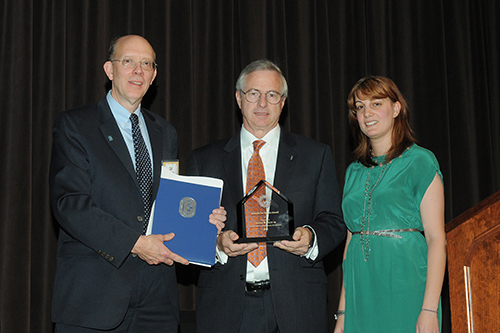The Educate for Service award is the highest honor graduates can receive from Elizabethtown College and its alumni association. Bestowed since 1966, the recognition is given to alumni who demonstrate commitment to Service through Professional Achievement, Service to the College or Service to Humanity.
This year, Elizabethtown College recognized Dennis Felty, a 1968 graduate, and the late Rev. Motlalepula Chabaku, of the class of 1981, for their dedication to service.
Felty was acknowledged with the Service Through Professional Achievement award for making a difference in the lives of children, young people, adults and families within the areas of intellectual disabilities, autism and mental health. Chabaku, whose name means ‘one who comes with the rain’ was recognized, posthumously, for Service to Humanity for her powerful voice in South Africa’s political landscape.
…Dennis Felty has helped to create, connect and sustain life-changing service organizations for thousands of people…”
“Much in the same way that a keystone is placed into an arch to lock the other stones in place and provide the essential link to support and sustain the overall structure, the passion, achievement and life focus of Elizabethtown College’s own Dennis Felty has helped to create, connect and sustain life-changing service organizations for thousands of people throughout Pennsylvania and beyond,” noted his service citation.
At a time when cruelty toward intellectually disabled, institutionalized individuals was at a peak Felty, with two of his classmates, left Elizabethtown College to pursue work in creating alternative solutions for institutions. They formed Keystone Human Services, which, in 1972 began moving people from the state hospital into community homes, and by 2009 the state facility was empty. Today Keystone employs more than 3,000 people, one of the largest in the area, providing community-based services to people with mental health and intellectual disabilities and autism.
Over the years, Felty also invited young people from Eastern Europe to participate in one-year leadership development internships in the United States, which then led to work for Keystone in Russia and the Republic of Moldova, helping intellectually disabled young men establish everyday lives. And he provided post-traumatic stress counseling to residents in a traumatized region of Russia that had been attacked by terrorists in 2004.
“From her early years as a classmate of The Most Rev. Desmund Tutu, to her later life as a powerful voice in South Africa’s political landscape, Rev. Chabaku never ceased to lift up all human beings. Motivated to action at 16 years of age, Reverend Chabaku joined the African National Congress and, within five years, cofounded the Black Women’s Federation of South Africa,” noted her citation, accepted posthumously by Elizabethtown College President Carl J. Strikwerda.
Chabaku was national secretary of the African National Congress’ Women’s League and she worked to bridge divides between opposing gangs and promote peace in London. In the late 1970s and early 1980s Chabaku participated in a cultural exchange program, earning degrees from Lancaster (Pa.) Theological Seminary in 1979 and Elizabethtown College in 1981. She also earned master’s degrees from North Carolina Agricultural and Technical State University.
Before returning to South Africa in 1991, Chabaku worked with missions and served as a United Methodist minister, an international scholar and an advisor-in-residence for various churches throughout North Carolina.
In Africa, she established churches for individuals who were persecuted for their support of the recently deceased Nelson Mandela. For seven years she Speaker of the Free State Legislature and, later, the Free State delegate to the National Council of Provinces as a member of the Gauteng Legislature in the National Parliament. After retiring from politics, Chabaku was a United Nations respondent and ambassador for Kuwa Ajabu Foundation, a nonprofit organization that assists female leaders in seeking solutions to socioeconomic and sociopolitical issues facing Africa.


